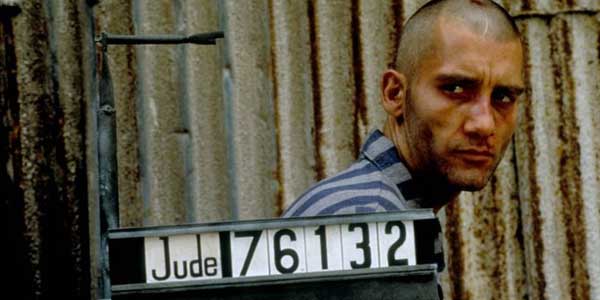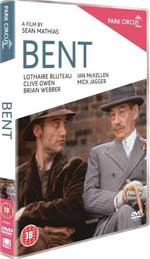
Director: Sean Matthias
Running Time: 105 mins
Certificate: 18
Release Date: (Blu-ray release) September 13th, 2010

It amazes me how many gay people know a pink triangle is a gay symbol but they don’t know why. However as gay history isn’t taught in schools, many don’t realise there is a long and complex history of homosexuality that goes beyond Ancient Greece and Oscar Wilde. Bent is based Martin Sherman’s play and stars Clive Owen as Max, who lives a decadent gay life in 1930s Germany, not caring who he hurts and feeling his looks and charm will get him everything he wants.
However as the Nazis’ power increases, life gets increasingly difficult for gay people and the net closes in on Max, who eventually gets rounded up and sent to Dachau. Once there he denies he’s gay, preferring the yellow star of David saying he Jewish to the pink triangle admitting he’s gay, as he knows Jews are more likely to survive than homosexuals. There he meets Horst (Lothaire Bluteau), who isn’t ashamed of wearing his pink triangle, and despite the difficulties and torments of concentration camp life, the two men form a complex bond.
Bent is a great play that needed more money to make it a great film. Due to a lack of budget and a few issues with the script, it feels somewhat trapped between the stage and the screen. As there obviously wasn’t a lot of money for expensive sets, many of the settings are done expressionistically, which works up to a point, but it’s difficult not to feel the movie is hemmed in by its lack of cash, and while it does its best to overcome that, it doesn’t fully work, partly because the script wavers between realism and being as symbolic as the sets.
However some of the best things about the play work extremely well in the film, perhaps most famously a scene between Max and Horst where they stand next to one another and have verbal sex. Some have described it as the sexiest scene in gay cinema history and while I wouldn’t go that far, it is powerful and engrossing.
Bent is a film that’s worth watching both for its look at gay life under the Nazis and its cry about the importance of staying true to yourself – it certainly has its fair share of powerful moments. It’s a shame that it never quite manages to escape the stage, but the performances are superb, and this is certainly the only movie where you’ll get to see Mick Jagger (who also produced the film) as a drag queen.
Overall Verdict: An important subject and a great play, but the film version doesn’t fully work even if it has moments of great power.
Reviewer: Tim Isaac





Leave a Reply (if comment does not appear immediately, it may have been held for moderation)